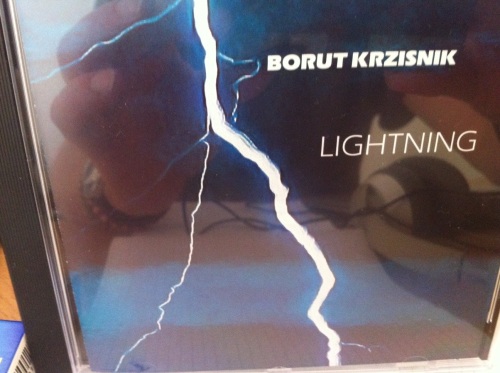
Cover of Borut’s CD
Borut Krzisnik (1961, Zagreb) is a Slovenian composer of contemporary music, based in Ljubljana. Born into a family of diplomats, he moved frequently during his childhood, both within former Yugoslavia and abroad, before finally settling in Ljubljana. Living among different nationalities and experiencing different mentalities helped form his understanding of diversity, something which certainly contributed to his broad approach to music. He played piano as a child, eventually switching to guitar and building up his unique way of composing. He graduated in Psychology from the University of Ljubljana, but soon afterwards devoted himself to music.
He released seven albums: LIGHTNING (Claudio Contemporary, 2013), VALSE BRUTAL (KUD France Prešeren, 2009), SACRE DU TEMPS (Station Zuid, 2007), A LIFE IN SUITCASES (First Name Soundtracks, 2006), STORIES FROM MAGATREA (KUD France Prešeren, 1997, US’s release: Falcata-Galia Recordings, 1999), LA DOLCE VITA (FV, Ljubljana/Discordia, Willich, 1995) and CURRENTS OF TIME (Recommended Records, London, 1991; re-release: Tone Casualties, Hollywood, 1998).
He wrote the score for Peter Greenaway’s film trilogy, Tulse Luper Suitcases and its integral version A Life in Suitcases. They were screened at almost all important film festivals (Cannes, Venice, Berlin, Rotterdam, Tribeca, Toronto, Montreal, Chicago, Philadelphia, Hong Kong, Edinburgh and many others). He has also joined Greenaway in some other projects: Gold – 92 bars in the broken car, theatre play in Schauspiel Frankfurt, The Reitdiep Journeys, documentary, Grand Terp, the complex exhibition in Groningen, Holland, and in exhibition Map to Paradise, Ljubljana.
One of the best examples of happy marriage between visuals and music are two theatre performances conceived and directed by American/Brasilian director Gerald Thomas: Nietzsche Contra Wagner (2000) and Anchorpectoris – United States of the Mind (2004). Gerald Thomas used his music as one of the cores of his plays. It is perfect example of Thomas’ “absolute theatre” – it includes various (theatre) languages, from “conventional” theatre, ballet, opera to physical theatre.
Among his works for dance, the most outstanding collaboration is with internationally acclaimed Romanian born choreographer Edward Clug. They join forces in Sacre du Temps (Tilburg, 2007), Skitzen (Graz, 2010), Divine Comedy (BITEF, 2011), Songs for the mating season – Hommage a Stravinsky (SNG Maribor, 2012. These inspiring performances draw their energy both from classical ballet and contemporary dance.
Recently, apart from his albums, he devoted himself to contemporary dance projects. He colaborated with Thomas Noon, Ana Lujan Sanchez, Josh Beamish, Virpi Pahkinen and Gyula Berger.
Very important were his numerous collaborations with Slovenian director Emil Hrvatin and British director Julie-Anne Robinson (Blackpool…). Although different, what they have in common is their characteristic synthesis of revealing concept and bold interpretation. They are continuously present on European stages with culminations in Picollo Teatro in Milan, Bush Theatre and Royal National Theatre in London.
Borut Krzisnik was also the initiator and a member of DATA DIRECT, a group that united Slovenian, Italian and Yugoslav musicians who stem from various musical areas: symphonic orchestra, ethereal folk music of the Balkans, improvised jazz, “avant-garde rock”, noise etc. They were using a great variety of instruments, sensibilities and methodologies which led to strong, almost visual experiences.
Other collaborators have included Vinko Möderndorfer, Zlatko Bourek, Bojan Jablanovec, Matjaž Pograjc, Pepi Sekulić, Natasa Prosenc, Tibor Levay, VSSD etc. He is also known for his work with the groups Laibach and Borghesia.
Krzisnik won Vesna prize for best music at Slovenian Film festival in 2008 (film Landscape No2) and first prize at the Napoli Danza Festival; Il Coreografo Elettronico (art video Labyrinth).
http://www2.arnes.si/~ksbkrzi/
WATCH BITS OF:
Nietzsche Contra Wagner (2000)
http://geraldthomas.net/PP-Nietzsche-Contra-Wagner.html









